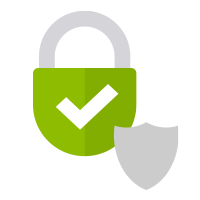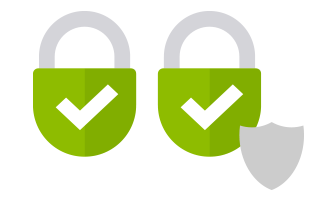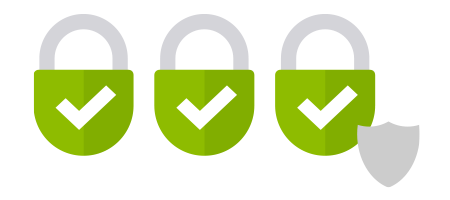SSL certificates
Secure your site and add trust & confidence for your visitors.

Security


Improve Your Search Engine Ranking
Establish trust and online security for your website visitors and business.
Encrypt sensitive data
Protect user privacy
Secure online transactions
Activate HTTPS and the lock icon
Prove legitimacy
Increase SEO rank
FAQ
What is an SSL Certificate?
SSL Certificates enable data encryption on the internet and allow data to be transmitted securely from a web server to a browser. With SSL, your website can use the HTTPS protocol and display a padlock in end users’ web browsers to indicate that the connection is secure.
Why do I need an SSL?
SSL Certificates are an essential part of the internet. They not only encrypt communication between your computer and the server where a website is located, but they also verify that a site is what it claims to be.
What are the different types?
There are three different levels of vetting that SSL Certificates are based upon: Domain Validated (DV), Organization Validated (OV) and Extended Validation (EV). The certificate types’ major difference relates to what kind of information the Certificate Authority (RapidSSL, GeoTrust, DigiCert) requires and validates to issue a certificate. The higher levels of certification require more information and are often displayed in the browser bar. For example, EV SSL turns the browser bar green and displays the organization name to visitors to generate more trust.
Advantages of an EV SSL
Or Extended Validation is the highest SSL class available today and gives more credibility and trust to your website than other SSL Certificates. They include features such as the green address bar and display of your company name that have been proven to boost trust and consumer confidence.
Are all SSL the same?
No. There are many different types of SSL certificates based on the number of domain names or subdomains owned, such as:
Single – secures one fully-qualified domain name or subdomain name.
Wildcard – covers one domain name and an unlimited number of its subdomains.
Multi-Domain – secures multiple domain names and the level of validation needed, such as:
Domain Validation – this level is the least expensive and covers basic encryption and verification of the domain name registration ownership. This type of certificate usually takes a few minutes to several hours to receive.
Organization Validation – in addition to basic encryption and verification of ownership of the domain name registration, certain details of the owner (e.g., name and address) are authenticated. This type of certificate usually takes a few hours to several days to receive.
Extended Validation (EV) provides the highest security degree because of the thorough examination conducted before this certificate is issued (and as strictly specified in guidelines set by the SSL certification industry’s governing consortium). In addition to ownership of the domain name registration and entity authentication, the entity’s legal, physical, and operational existence is verified. This type of certificate usually takes a few days to several weeks to receive.
Who needs an SSL certificate?
Any individual or organization that uses their website to require, receive, process, collect, store, or display confidential or sensitive information. Some examples of this information are:
logins and passwords
financial information (e.g., credit card numbers, bank accounts)
personal data (e.g., names, addresses, personal identification number, birth dates)
proprietary information
legal documents and contracts
client lists
medical records
Where can you get SSL?
Probably the most important part of an SSL certificate is where it comes from. Certificate Authorities (CAs) issue SSL certificates, organizations that are trusted to verify any entity’s identity and legitimacy requesting a certificate.
The CA’s role is to accept certificate applications, authenticate applications, issue certificates, and maintain status information on certificates issued.
You may also be able to purchase digital certificates from a domain name registrar or website hosting provider.
Keep in mind:
When choosing the right SSL provider, consider that users’ web browsers normally keep a cached list of trusted CAs on file. So if a digital certificate is signed by an entity that’s not on the “approved” list, the browser will send a warning message to the user that the website may not be trustworthy.
